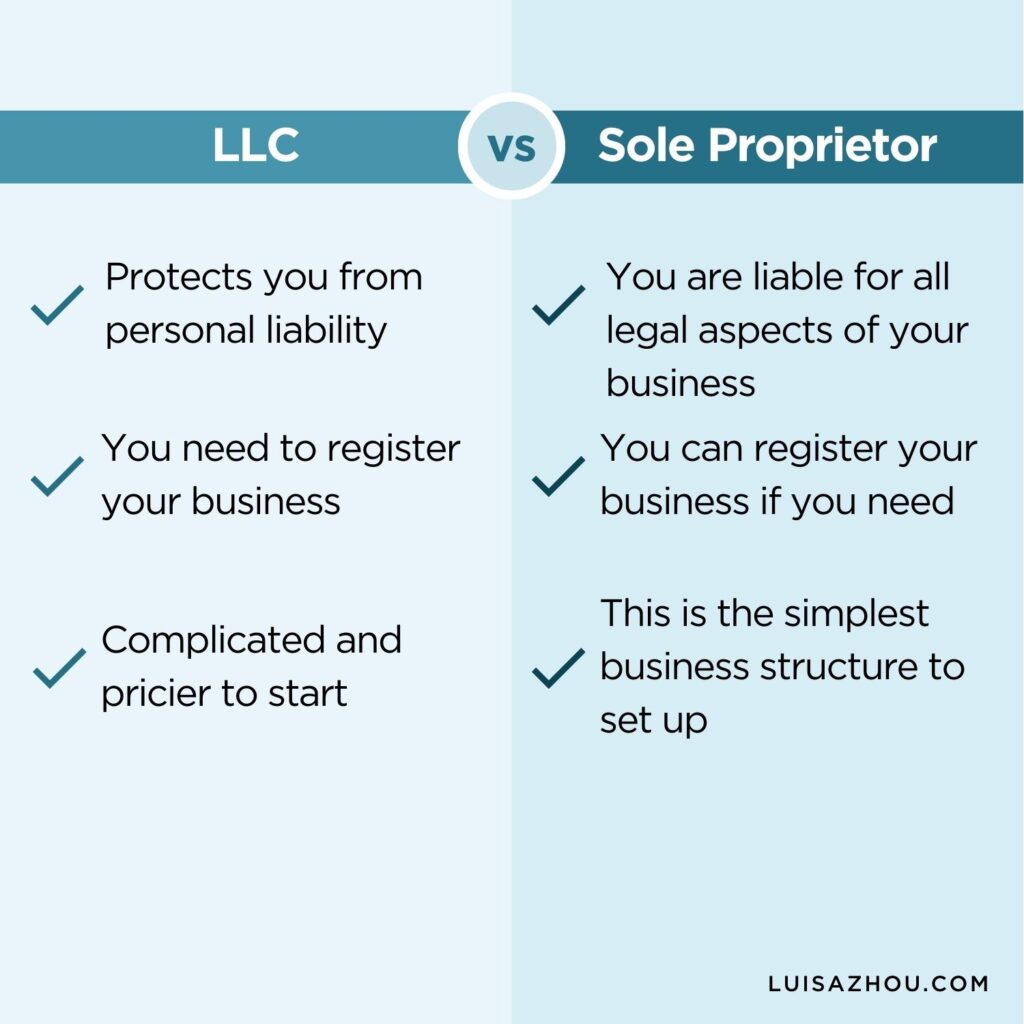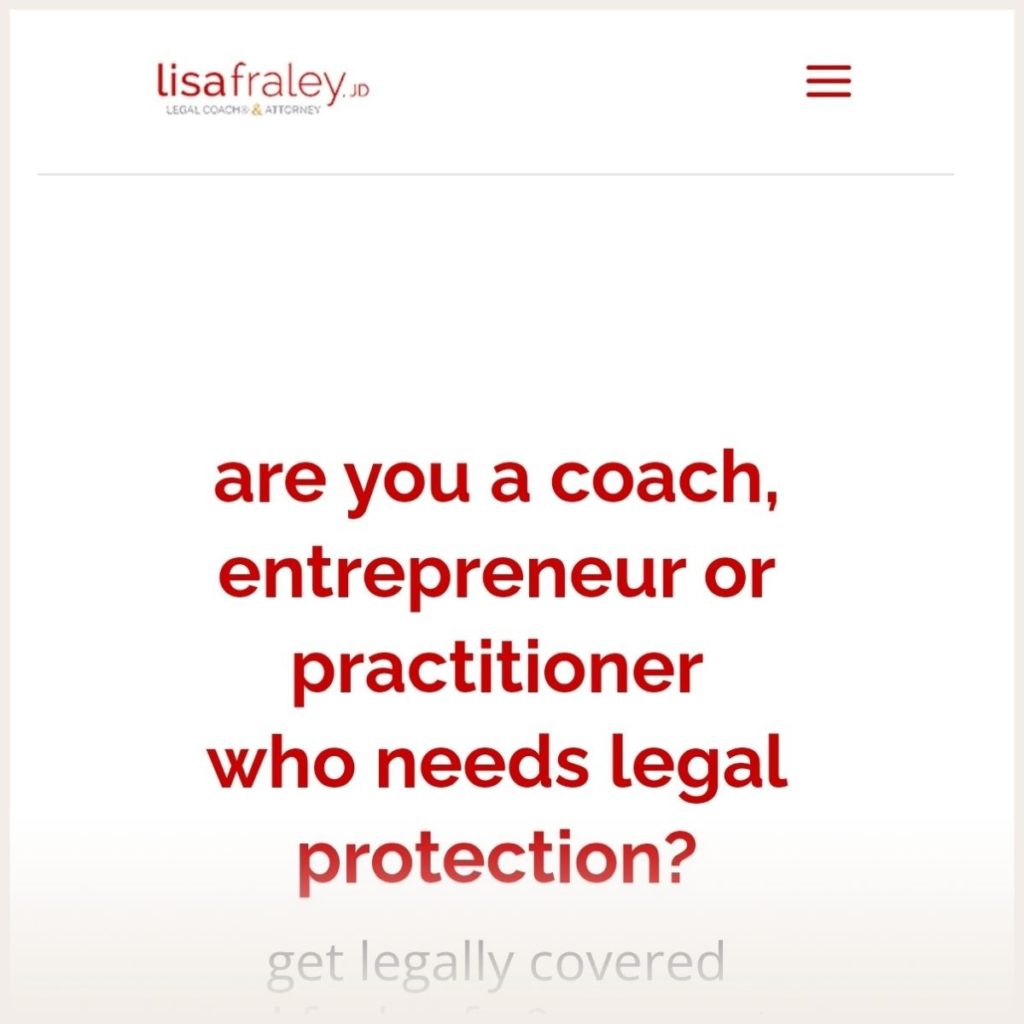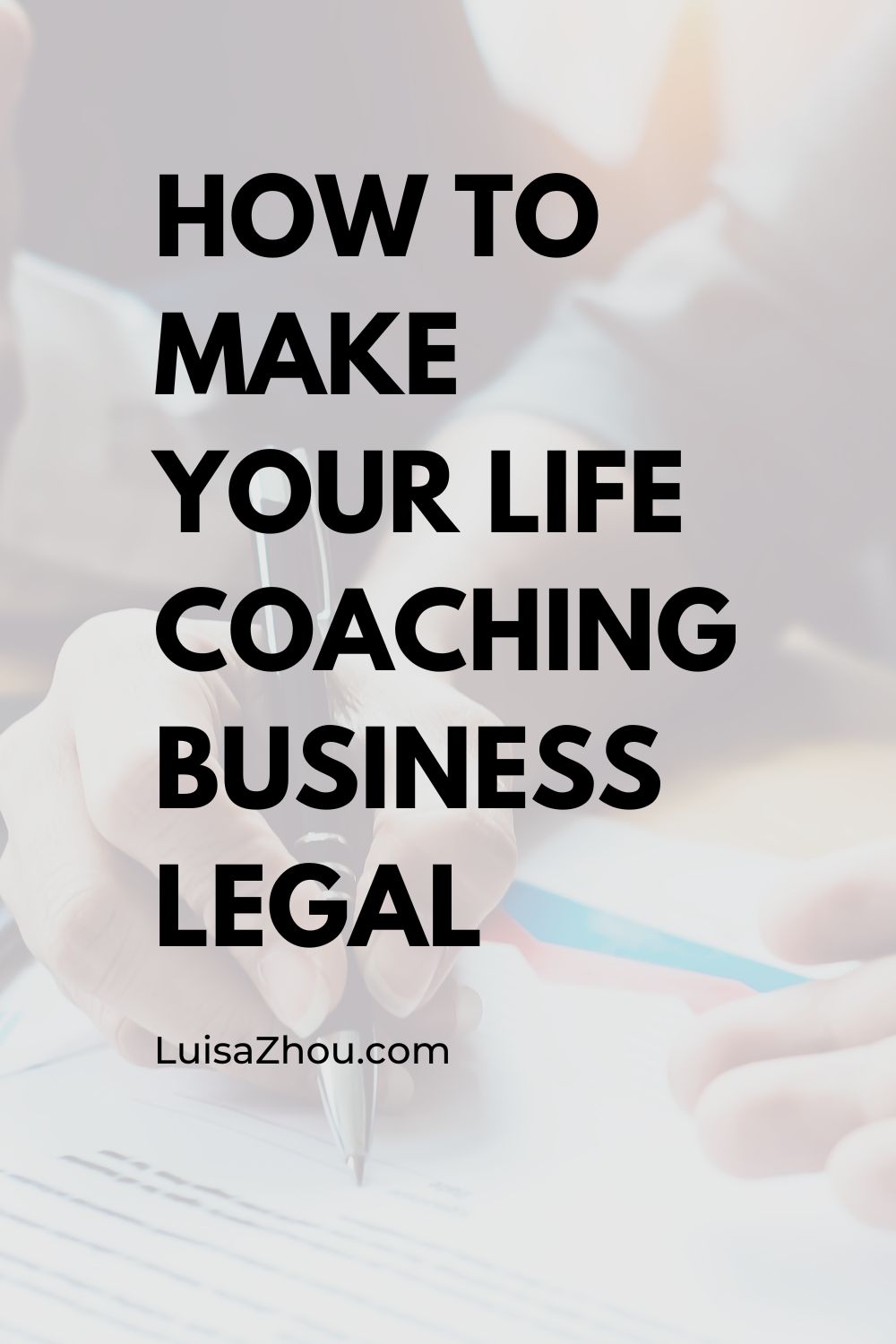What are the legal requirements for life coaching businesses?
You’re in the right place to learn how to keep your business safe.
In this guide, you’ll learn:
- Who can coach
- If coaches need licenses
- How you should register your business
- And so much more
Want to learn more? Read on!
We’ll cover:
What qualifications you need as a life coach
Top legal requirements for life coaches
(Note! I researched what my friend Lisa Fraley has to say about this topic to create this blog post. Lisa is a legal coach for coaches and other online entrepreneurs.
However, this article doesn’t constitute legal advice, so always seek help from a legal professional to understand your specific case.)
Do you need a degree as a life coach?
Life coaching is about supporting and guiding clients to achieve their goals in life. It’s comparable to mentoring – but paid and with clear duties and expectations on both sides.
So what’s needed to become a life coach?
As life coaching is a broad term, it includes various coaching niches including career, health, mindset coaching, and more.
Life coach requirements can be niche-specific. Here’s an overview.
What qualifications do you need as a life coach?
Most life coaches don’t need any specific qualifications. There are a few exceptions in the health and mental health niches, but as a general rule, you don’t need certifications or degrees. Coaching is an unregulated industry in the US.
Get the Ultimate Guide
for building a
6-Figure Coaching Business so you can achieve more freedom!
Can you call yourself a life coach without a certification?
Yes, you can become a life coach without a certification because most niches are unregulated. The life coaching certification industry is unregulated, too, so by getting one, you won’t get any officially recognized qualifications.
But should you start coaching without a life coach certification? It’s up to you. Personally, I don’t consider certifications a necessity.
(Except for, again, in the niches where they are required – always research your niche thoroughly before starting your coaching business.)
You gain the same experience by starting to coach. And to get your first clients as an inexperienced coach, you can lower your rates.
Once you have worked with a few people and improved your coaching skills, you’ll then raise your rates.
Your first few clients get to work with you for less than they normally would. So it’s a win-win situation for all.
That said, if you DO want to become a certified life coach, get accredited coach training from legitimate credentialing bodies like the International Coaching Federation or a well-known university. These types of organizations deliver coach-specific training that is widely recognized and the programs hold a high standard.
And how do you find the best accredited coach training? Here’s a list of the top life coaching certifications in different niches.
Therapy vs coaching
Therapy and coaching often get compared with each other. But hey are in no way the same thing.
Therapists are mental health professionals who:
- Are required to get the right education to practice
- Work with specific methodologies and make diagnoses
That’s not what coaching is about, at all. Unless you’re a medical professional, you wouldn’t diagnose people. Instead, coaching is about offering a support system to help people achieve their goals.
For instance, some getting sober would go to a therapist to get diagnosed and get help with their underlying mental health issues. A recovery coach, on the other hand, might draw from their own experience and support their client in building new habits or keeping accountable.
Now that you know what qualifications you need as a coach, let’s take a look at the legal requirements for life coaching.
What are the legal requirements for life coaches?
Here, we’ll look at the most important life coach requirements, from registering your business to contracts and licenses.
With that, let’s jump right in.
Business registration
Do you need to register your business?
That depends on your location and business structure.
In most cases, small business owners simply register their business name with state and local governments.
And if you conduct business in your own legal name (something I recommend for non-legal reasons to make your business as straightforward as possible), you won’t need to register at all in some cases.
However, registering your business comes with legal and taxation benefits. For more information on registration (and your specific life coach requirements), take a look at this guide by the SBA.
You can also check Lisa’s services on forming LLCs, S-corps, and C-corps. Plus, she offers a package on registration and taxation for new businesses.
Overall, though, you have two options. You can either offer searches as a sole proprietor.
This business structure means that you’re liable for all legal aspects of your business. You can still register your business, but it’s overall a simpler business to start.
The other option is to register a legal business entity as an LLC (limited liability company). This structure means that your business is separate from you and protects you from personal liability, but it’s also more complicated and costly to start.

Legal disclaimers and terms and conditions
Disclaimers and terms and conditions help you lay down the ground rules for people who are:
- Visiting your coaching website
- Engaging with your business
- Buying from you
Also, a privacy policy will be helpful to tell website visitors how you use their data.
The easiest way to create your own ToC, disclaimer, and terms and conditions is to buy drag-and-drop templates from a legal coach like Lisa Fraley (she offers a package with all of these agreements) or from a service like LegalZoom.

Life coach license
Does a life coach need a business license?
No, life coaches don’t need a license. You would need one to offer therapy or counseling, but not coaching.
However, always check the specific regulations for your niche, as there might be rules that apply to the services you offer For instance, if you offer nutrition coaching, you need to be aware of the requirements for nutritionists in your state.
Get the Ultimate Guide
for building a
6-Figure Coaching Business so you can achieve more freedom!
Life coach contract
You will need a coaching contract to offer your services.
While a contract isn’t mandatory, it helps you establish the rules for your coaching relationship with prospective clients. I absolutely recommend that you create one before you take on your first coaching client.
Both sides know exactly what to expect from the services, what’s included, and what your and the client’s boundaries are.
Your coaching agreement should at least include a description of your services. You’ll specify:
- The number/duration of coaching sessions
- What coaching sessions cover
- Your rate
- The length of your coaching relationship
- Termination and cancellation policies
Again, Lisa has some excellent packages to help you get started. This legal package includes a contract template.
Refunds
Refunds are pretty rare if you offer quality services/products and you’re clear and transparent in your sales/marketing.
But they do happen – for any business.
Most coaching businesses get at least a few refunds for every hundred coaching clients.
To protect yourself against unjustified refunds, make sure your contract includes a clause on when you offer refunds and you don’t.
So if someone requests a refund but is in clear violation of your contract, you can hold them to the contract.
Here’s more on refunds:
Trademarks
Trademarks serve a few purposes. They give you the exclusive right to use your words or logo in a Trademark class for 10 years. Intellectual property rights are also business assets that can increase the value of your company.
The first step to trademarking is to do a search to ensure the words or image you want to trademark are available. The next step is to file for a trademark application. You’ll likely need to work with a lawyer for both steps.
The benefits are that you preserve the uniqueness of your brand. However, I personally don’t use trademarks in my business…simply because the distinctiveness of a brand is so much more than words/your logo.
Instead of using time and energy on trademarking, focus on building a strong brand.
Copyright
When you create any original work (images, text, photos, videos…), you get copyright rights for that work. On the flip side, you also need to respect other people’s copyright.
Say, if you want to use someone else’s photo on social media, you need to get their permission either directly or through a license. For instance, you’re free to use images from photo sharing websites like Pexels.com.
But copying an image from Google and using it in your content is typically not ok (unless that specific photo has a license or similar).
Legal templates for coaches
We’ve talked about the most common legal requirements for life coaching. But how do you find all the legal documents you need for your business?
Again, I recommend my friend Lisa Fraley. Check out her legal templates library, including:
- Starter kits for personal coaching, group programs, online courses, masterminds, and medical practices (includes agreements and website terms)
- Disclaimers and waivers for websites, social media, videos, books, events, testimonial releases, and more
- Agreements and consent forms for personal coaching, group programs, online courses, individual life coaching sessions, and more
- Business registration and collections checklist and letter
- Sales terms, information on corporate entities, trademarks, cease and desist letters, contracts for team members, and so much more
Next, let’s take a look at how to preventatively avoid legal issues in your coaching business.
Avoid legal issues
How do you protect yourself from claims about your services?
Insurance is a good way to cover yourself.
The most common type of insurance for life coaches is professional liability insurance. This insurance covers you for the information and advice you give to clients, including omissions and errors.
These activities must be directly related to practicing your profession, so long as you don’t violate any laws and you’re in your scope of practice.
You can also get:
- General liability insurance to protect yourself from claims against physical harm like personal injury
- Cyber liability insurance to protect yourself against data leaks of private client information
- Workers’ compensation insurance to cover employee payments
- Commercial property and auto insurance for offices and cars
But do life coaches need insurance?
There’s no legal requirement (unless you’re practicing as a licensed professional). So it’s really up to you and whether insurance will give you that peace of mind.
Ultimately, a contract is the best place to start to protect yourself from client claims.
Get the Ultimate Guide
for building a
6-Figure Coaching Business so you can achieve more freedom!
Over to you!
There you have it. Those are the legal requirements for life coaching.
Starting a business takes a bit of research, but thousands of people do it every day – and so can you.
What’s your top motivation for becoming a life coach?
Let me know in the comments below!
(Disclaimer: This article is not meant as legal guidance or advice. Consult a legal expert for tailored legal information that applies to your specific situation.)
Learn more:
How to Start a Life Coaching Business
How to Market Your Life Coaching Business
The 16 Best Life Coach Online Courses








